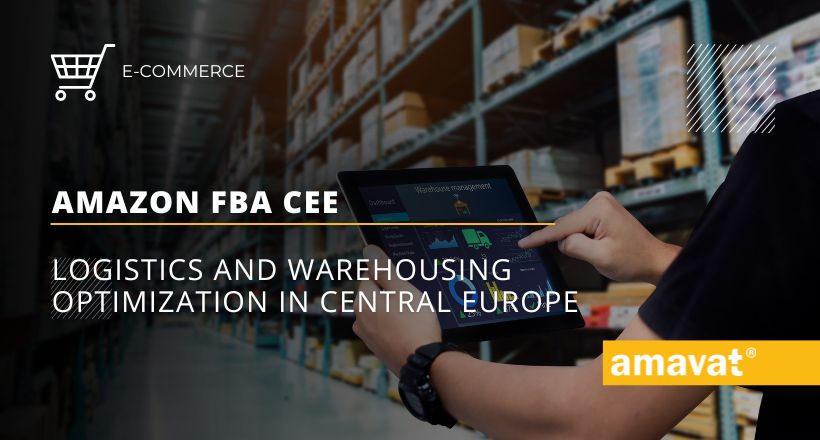Amazon FBA CEE: Logistics and warehousing optimization in Central Europe
Fulfillment by Amazon (FBA) is a model where sellers can entrust the entire logistics process to Amazon, including storage, packaging, shipping, customer service, and returns handling. One of the options available within this model is the FBA Central Europe Program (CEE), which allows sellers to utilize Amazon’s warehousing infrastructure in Germany, Poland, and the Czech Republic. Through this option, sellers gain access to the entire European market while optimizing storage and shipping costs.
What is the Amazon FBA CEE Program?
Amazon FBA CEE is a model where sellers’ goods are stored in Amazon’s warehouses located in Germany, Poland, and the Czech Republic. From there, the products are shipped to customers across Europe. Unlike other programs, such as the European Fulfillment Network (EFN), CEE does not impose additional fees on sellers for each unit sold. Operational costs in Poland and the Czech Republic are lower than in Western European countries, allowing Amazon to offer more competitive pricing in this program.
However, an important aspect of using the CEE program is tax obligations. Storing goods in warehouses located in Poland and the Czech Republic means that sellers must register for VAT in these countries and regularly submit tax returns. Before joining the program, it’s advisable to consult with experts to avoid issues related to improper registration or tax reporting: Contact us.
Advantages of the FBA CEE Program
Amazon FBA CEE offers several key benefits that can significantly impact the optimization of e-commerce operations:
- Lower operational costs: Storing in Poland and the Czech Republic is cheaper than in many other European countries. Costs related to order fulfillment, warehousing, and shipping are lower, leading to higher margins for sellers.
- No penalty fees: In the EFN program, sellers are charged additional fees for each unit sold when shipping to other countries. In the CEE program, such fees do not apply, making international trade more profitable.
- Flexibility in product delivery: Goods are stored in Germany, Poland, and the Czech Republic, but Amazon manages their distribution, allowing products to be delivered to customers across Europe. In practice, this means that the seller does not need to worry about logistics related to shipping to various countries.
- Optimized returns: Although goods are stored in Poland and the Czech Republic, Amazon treats return as local returns. This means that return handling is cheaper than if the products were returned to warehouses in other countries.
Challenges of Amazon FBA CEE
Despite many advantages, using the CEE program also comes with some challenges that sellers should consider:
- Tax obligations: VAT registration in Poland and the Czech Republic is mandatory for sellers using warehouses in these countries. This process can be time-consuming and failing to properly register or report can lead to serious legal and financial consequences.
- Longer delivery times: Compared to the Pan-European FBA program, where goods are stored in multiple countries, delivery times within CEE may be longer. This is because products are shipped from three central warehouses, which may affect customer satisfaction for those expecting quick delivery.
When is the CEE program worth choosing?
The Amazon FBA CEE program is particularly beneficial for medium-sized and growing sellers who sell at least a few hundred or several thousand units per month. For these sellers, the costs related to additional tax obligations are typically offset by the savings from not having to pay fees for each unit sold. The program is also ideal for sellers who are just expanding their operations in European markets and want to minimize operational costs without giving up the opportunity to trade internationally.
Tax and reporting obligations
While using the CEE program, sellers must be aware of the need to comply with local tax regulations in Poland and the Czech Republic. Primarily, they must report what is known as intra-community movement of goods. This involves notifying the countries where goods are stored that the products have been moved there for warehousing purposes. The seller must also regularly submit VAT returns and monitor cross-border and local transactions.
It’s also important to pay attention to the tax rules for selling to consumers (B2C) in different countries. For example, goods delivered from a warehouse in Poland to a customer in Germany are subject to German VAT.
How to join the FBA CEE Program?
Registering for the CEE program is relatively straightforward. Simply log in to Seller Central, then go to the “Fulfillment by Amazon” section. There, under cross-border settings, you can select the option to store goods in Germany, Poland, and the Czech Republic. Once the changes are confirmed, Amazon will automatically start distributing goods to the appropriate warehouses in Central Europe.
We can help with VAT registration and VAT returns in Amazon FBA CEE
Using the Amazon FBA CEE program comes with the obligation to register and submit VAT returns in countries like Poland and the Czech Republic, where your goods are stored.
At amavat®, we offer comprehensive support in the VAT registration process, VAT return submission, and adapting to the evolving e-commerce landscape. With our services, you can focus on growing your business, knowing that all tax formalities are in good hands.
Using our support guarantees that you avoid mistakes and issues related to VAT accounting, allowing you to conduct your international business smoothly: Contact us.
Summary
The Amazon FBA CEE program is an attractive option for e-commerce sellers looking to optimize their operational and warehousing costs while offering their products on a large scale in Europe. Storing goods in Poland, the Czech Republic, and Germany allows for lower logistics costs, no penalty fees for international sales, and flexibility in delivering goods to customers in various countries. However, the program also requires meeting various tax and reporting obligations, making collaboration with a tax advisor crucial to avoiding potential problems.





